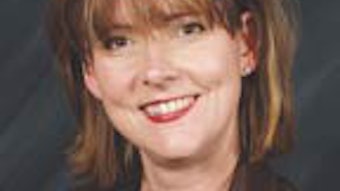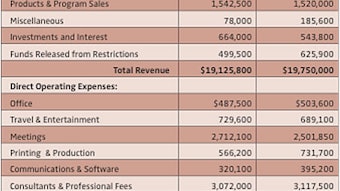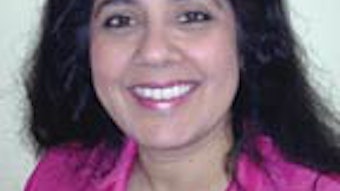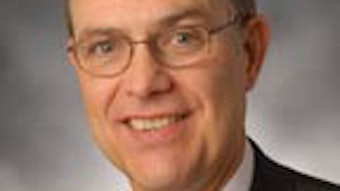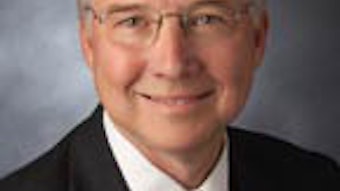Official Statements of Leadership Candidates
Candidates for President-elect (vote for one) The Academy will conduct its 2012 annual Board of Directors selection with online balloting, in an effort to streamline the voting process and increase participation. The official candidate statements are published below. On July 2, you will receive an email instructing you on the voting process. To ensure you can participate, you must be a member in good standing, and the Academy must have an active email address for you. To update your profile, log in at http://www.entnet.org/Community/memberProfile.cfm. Michael G. Glenn, MD Identify two strengths and vulnerabilities of our Academy and explain how you would propose to leverage those strengths and overcome those vulnerabilities to ensure future stability and success of the organization. 1. It’s truly an honor to be considered for this important leadership role, especially at a time when healthcare in America is at such a critical juncture. How effectively we are able to respond to the many challenges that face our specialty—and ultimately the patients we care for—will depend, to some extent, on the effectiveness of our Academy leadership and our strategic plan. More importantly, our success will depend on commitments from each of us to personally contribute in some way to the effort. Member engagement is one of our greatest strengths: the willingness of so many of our members to contribute their knowledge, their time, their leadership skills, and even their financial resources is remarkable. I am willing to make such a commitment, and I will invite and encourage each of you to do so as well. Another strength is our growing sense of unity within otolaryngology. Relative to other specialties, we are just not that large. However, our influence can, and should, be disproportionately greater than our absolute numbers. By making certain that the Academy represents all of otolaryngology, in all of its richly diverse aspects, we optimize our effectiveness. We should further develop our Specialty Society Advisory Council, and pursue a vision that our membership and our leadership will reflect the diversity of the patients we serve. We must remain relevant to members from every subspecialty, welcome innovative ideas, and respectfully incorporate potentially conflicting viewpoints and priorities. In the context of the Academy’s Strategic Plan, what changes do you envision will be necessary in our Academy during the next three to five years in order to meet the educational, research, advocacy, and fiscal challenges presented by evolving healthcare policy and legislation? 2. I believe our most fundamental challenge is to convincingly demonstrate the value of the unique services we provide. This value must be made obvious to those who are even now making decisions as to the relative worth of our services in new models of care and reimbursement. We must be able to define, measure, and transparently report the value of our work. This will require commitment to further guideline and quality metrics development, and to systems that facilitate their incorporation into our practices. We must communicate this message of value with a clear and unified voice; reaching out to our patients, to those who pay for healthcare, and those who set policy in a compelling and convincing manner. This will require strengthening our advocacy presence, both through broader PAC participation and through effective coordination of our grassroots engagement efforts. What is the most important issue facing otolaryngology-head and neck surgery, as a profession, in the next two to three years? 3. So, we do not lack for challenges, and there is plenty of potential for frustration. No one will argue that. But we are fortunate. There is meaning, and sometimes even joy in the work we do. We need more of both. We need solutions that optimize professional satisfaction, and patient outcomes. I believe they exist. My experience in an academic referral-based practice, followed by an even longer stint in a large, innovative multi-specialty group has taught me that our challenges are more shared than disparate. I’ve seen that a compelling vision and supportive, respectful leadership can make a difference. I would welcome the opportunity to take on these many challenges with my colleagues on the Academy leadership team. Richard W. Waguespack, MD Identify two strengths and vulnerabilities of our Academy and explain how you would propose to leverage those strengths and overcome those vulnerabilities to ensure future stability and success of the organization. 1. Our strategic planning process and caliber of Academy leadership are perhaps our greatest strengths. Strategic planning provides our roadmap as we look forward in an increasingly complex medical environment. Virtually every significant Academy activity is viewed from the perspective of adherence to the strategic plan, which in turn is reappraised annually. Our vulnerabilities include fragmentation and loss of specialty unity coupled with our relatively small size. Enhancing strategic planning with a long-range view is axiomatic as is the importance of identifying and mentoring the next generation of leaders. It would be my intention to seek out potential leaders on as broad and diverse a basis as possible from within our Academy. Every opportunity to engage our subspecialty societies in Academy activities (e.g., advocacy, education, research) must be explored, not to subsume those societies, but to optimize and enhance our specialty’s influence. The existing Specialty Society Advisory Council is a wonderful mechanism that will be utilized to its full potential. Encouraging member involvement in entities outside of our specialty, such as the AMA CPT Editorial Panel, magnifies our influence. In the context of the Academy’s Strategic Plan, what changes do you envision will be necessary in our Academy during the next three to five years in order to meet the educational, research, advocacy, and fiscal challenges presented by evolving healthcare policy and legislation? 2. The Academy has been in the forefront of education, but will need to adopt new methods of delivering relevant materials to members, typically in an electronic format. It must become increasingly involved with development of educational content to assist members to maintain Board Certification. Coordinating these efforts wherever possible with our sibling societies and among the coordinators for program, instruction courses, and education should help avoid duplicative efforts in these times of limited resources while maintaining the highest content standards. To receive reimbursement for use of new and existing technologies, it is increasingly important that evidence-based research be available to support medical necessity and effectiveness. The Academy must help coordinate and disseminate this outcomes-based research. During the last couple of years, in addition to its ongoing work with CMS, the Academy has devoted increasing resources to reviewing reimbursement policies of private payers. These activities must continue because of their profound potential effect on membership. In these times of decreasing corporate support, the Academy has created a robust development initiative, which I fully support. What is the most important issue facing otolaryngology-head and neck surgery, as a profession, in the next two to three years? 3. Perhaps the greatest challenge the specialty faces is the relentless trend of decreasing reimbursement and increasing expenses and administrative burdens experienced by most members. Regardless of the fate of the Affordable Care Act, this squeeze seems inexorable and will likely result in changes decoupling reimbursement from the traditional fee-for-service model. Adding to this uncertainty are additional mandates to employ EMRs, utilize electronic prescribing, and implement ICD-10 diagnostic coding. I believe it is the Academy’s role to provide members with as many tools as possible to deal with these changes and, wherever possible, modify or mitigate unreasonable elements. For example, eliminating some of the burdensome ICD-10 coding rules and further delaying its implementation are goals worth consideration. These changes, of course, are occurring in the context of a flat to shrinking workforce and scope-of-practice pressures from non-physician providers. Candidates for Director At-Large (Academic) (vote for one) In your view, what are the three most important elements of the Academy’s current Strategic Plan and how would you propose advancing them? Maisie L. Shindo, MD I am honored to be nominated to serve as director at-large. Our Academy can play a major role in developing policies to improve reimbursement for our specialty, stop unfair business practices, and address scope-of-practice legislation. We need to work with policy makers to ensure that we can provide cost-effective, high quality, compassionate care through efficient clinical care delivery systems. Another important role of the Academy is education of providers and the public, and to promote scientific research. Evidence-based medical research is critical to defining the best treatment paradigms and delivery of the highest quality healthcare. We need to raise funds for this endeavor. The Academy has a long track record of facilitating data collection and multicenter outcomes-based research and should continue to foster this. Furthermore, we need to raise public awareness of the outstanding research our specialty has produced. It would be a privilege for me to serve as director at-large and build on the Academy’s strengths to develop initiatives to keep driving all these issues forward. I would also incorporate member input to define the vision that serves our membership. Kathleen L. Yaremchuk, MD, MSA Education and Knowledge; Research and Quality; Membership Strength and Unity For the Academy’s strategic plan to be successful each element must be put in context with an unwavering commitment by our specialty to patient care. To remain relevant in this era of healthcare reform, the specialty of otolaryngology must pursue evidence-based research in the efficiency and cost-effectiveness of patient care in relation to quality of care and patient outcomes. To demonstrate our value as specialty providers, we need to stay at the forefront of discovery for the patients who rely on us for care that only we can provide. The Academy needs to align research and quality activities with those of education and knowledge to develop a road map for Maintenance of Certification. By embedding these activities, the rank and file of otolaryngologists will become a narrow network of high-performing providers who are recognized as thought leaders and clinical experts in delivering high-quality, cost-effective, advanced patient care. Although the field of otolaryngology lacks the large numbers of other specialties, the Academy’s focused efforts of education, research, and quality improvement will serve to enhance the strength and unity of our membership as we continue to educate the government, payers, and the public on the clinical, educational, and research value of our specialty. Candidates for Director At-Large (Private Practice) (vote for one) In your view, what are the three most important elements of the Academy’s current Strategic Plan and how would you propose advancing them? Phyllis Bergeron Bouvier, MD Advocacy/Health Policy: Despite the uncertainty created by the Affordable Care Act, we must clearly and carefully map out our future strategies, which should be adaptable to our changing healthcare environment. Informed by my experience with the Board of Governors as a public relations representative for the Diversity Committee, I believe we should continue our outreach efforts to legislators and other policy- makers. Also, developing alliances with community physicians will help us understand the needs of our members and recruit policy advocates. Research and Quality: As a physician of the Colorado Kaiser Permanente Medical Group for 21 years, and as a representative to the Kaiser National Diversity Council for 14 years, I have been involved in quality and research efforts around equitable care. I know from practice that evidence-based care that is replicable in outcomes, yet adaptable to the individual, is essential to effective and safe treatment of patients. Membership Strength/Unity: Our strength and our challenge lie in our diversity. How can we manage and serve our global membership when there are gender differences in communication, generational differences influencing our workplace interactions, and barriers to inclusion? We have rich cultural resources waiting to be tapped. These varied viewpoints empower our Academy. Duane J. Taylor, MD The future of our specialty lies not only in the training that is provided to our residents, but also in the example our Academy demonstrates in the areas of advocacy, education, and unity. The past few years for our Academy have been exciting and monumental in the face of a changing healthcare environment, both for us and our patients. I have been an active member of the Board of Governors for nearly 20 years, served on numerous committees, attended yearly legislative meetings, and currently serve as chair of the Diversity Committee. The opportunity to attend our Board of Directors meetings as a non-voting guest during the past few years (representing the Diversity Committee) has confirmed my interest in continuing to serve our great organization. We must continue to be 1. tuned in to the needs of our membership, 2. unified in our efforts and attention, and 3. always focused on empowering our membership to “deliver the best patient care.” I am honored to be considered for this position and am prepared to serve. Candidates for Audit Committee (vote for one) What is your particular experience or interest that would make you an effective member of the Audit Committee of the Academy? Steven W. Cheung, MD I am experienced in audit, budget, and operations matters that affect large and small enterprises. Leveraging an MBA in finance from the Berkeley Haas Business School, I served as chair of the Committee on Academic Planning and Budget at the University of California, San Francisco from 2010 to 2011. Our committee analyzed and responded to post-employment benefits reform, reallocation methodology of state funds to the campus, policy change to outside professional income, operations consolidation of contracts and grants, and a new funds flow model for the entire University of California. I am currently a member of the Finance Committee for the Association for Research in Otolaryngology and the Audit Committee for the American Otological Society. I enjoy reviewing accounting statements to assess financial and operational positions of organizations. Critical financial data analysis can help shape organizational decisions to promote accountability, financial stability, and operational efficiency. It would be an honor to serve on the Audit Committee. This advisory group plays a central role in assisting the Board of Directors to fulfill fiduciary duties to the membership. Academy members deserve independent-minded, critical, and comprehensive review of their organization’s financial and operational practices. I hope to be your vigorous advocate for accountability. Gregory A. Grillone, MD I would be extremely honored to serve as a member of the Audit Committee. I have a strong commitment to serving the Academy and have been active as a member of the General Otolaryngology Education Committee in the past. I also served as the American Bronchoesophagological Association (ABEA) representative to the Academy, and currently serve as the ABEA representative to the Board of Governors. My experience in financial oversight comes from a number of current leadership roles, including associate chief medical officer at Boston Medical Center (BMC), member of BMC’s Revenue Committee, chair of BMC’s Graduate Medical Education Committee, secretary of the ABEA, and vice chairman of the department of otolaryngology at Boston University Medical Center, as well as several past leadership positions. These include interim chief medical officer and vice president of medical affairs at BMC from 2007 to 2008, and secretary-treasurer of the New England Otolaryngological Society. If elected, I will work closely with the Academy and assist the Board of Directors to ensure appropriate oversight of the Academy’s financial matters. Candidates for Nominating Committee (Private Practice) (vote for two) What do you see as the priorities of the Nominating Committee in selecting the future leaders of our Academy? Gady Har-El, MD I thank the Academy leadership and the current Nominating Committee for considering me for the position of a member of the Nominating Committee. If elected, I will strive to nominate candidates from all aspects of otolaryngology practice. The traditional division between academic medicine and private practice is becoming less distinct and, therefore, increasingly irrelevant. During the last 15 years, a new category of otolaryngologists is emerging. These are neither academicians nor pure private practitioners. They are members of large (sometimes gigantic) single specialty and multi-specialty groups or hospital systems. They deserve a voice and representation. As a Nominating Committee member, I will also seek the nominations of candidates with diverse backgrounds including age, race, gender, and subspecialty. A candidate who has served his/her local community well is as important to be considered for leadership position as those who previously had positions in the Academy and other national organizations. Vision, commitment, dedication, and the ability to advocate for our profession are the qualities I seek in a potential candidate. And lastly, I will support candidates who can inspire young physicians to engage, to participate, and to become active in our great specialty as well as dedicated members of our Academy. Theda C. Kontis, MD It is an honor to have been selected as a candidate for, and will be a greater honor to serve on, the Nominating Committee. The members of this committee are charged by the Academy to select our future leaders. This responsibility demands a group of forward thinking individuals who will represent the Academy membership. The AAO-HNS is a diverse group and the Nominating Committee must represent young and experienced members, as well as those in academic medicine and in private practice situations. With my present experience as a partner in a mature private practice, and a part-time faculty member in a vibrant university-based otolaryngology department, I have a broad background in both perspectives. As a past president of the Maryland Society of Otolaryngology and a hospital board member, I know the rapidly changing regulatory issues that affect AAO-HNS membership. I have served on and chaired numerous committees in the AAFPRS, I have been the program chair for a recent AAFPRS annual meeting and with such, I will honor the responsibility of an AAO-HNS office. Jacqueline E. Jones, MD It matters not whether the Democrats or Republicans win the upcoming election; medicine as we know is destined to change. As individual physicians and a collective Academy we can be passive participants in this change or we can be leaders. We can assure that our patients have access to quality care and that we, as physicians, can practice medicine in a manner in which we feel comfortable. The priorities of the Nominating Committee of the Academy must be to identify and promote medical leaders to steer us through these difficult times. My background as an academic otolaryngologist at a large University Medical Center for 13 years, and nine years in private practice, allow me to understand the concerns of our diverse membership, and identify individuals who will represent all of our interests. Thank you for your consideration of my candidacy to serve the Academy as a member of the Nominating Committee. P. Ashley Wackym, MD While serving on the Academy Board of Directors as the first coordinator for research, I came to understand the importance of identifying diverse individuals who were collaborative and comfortable in making decisions focused on our broad membership. We need to populate leadership roles, through election, with members who are experienced and willing to serve unselfishly. The Nominating Committee plays an incredibly important role in ensuring that our Academy has a slate of candidates who would all be outstanding leaders so that the membership can decide who they wish to represent them. The Academy has been an important part of my professional life during the past quarter century. Giving back to the Academy is very satisfying, whether it be committee service, grant reviews, participation in developing new programs, playing leadership roles, or financially via vehicles, such as the Millennium Society or the Hal Foster, MD, Endowment program. My past career in academic medicine and now as a corporate officer in a nonprofit healthcare system has given me a broad experience to draw from in helping to identify other members who would be willing to serve. Serving our Academy as a Nominating Committee member is a responsibility I would welcome. Candidates for Nominating Committee (Academic) (vote for two) What do you see as the priorities of the Nominating Committee in selecting the future leaders of our Academy? Susan R. Cordes, MD Our Academy is highly dynamic and forward thinking, and as such, candidates for leadership must also display these characteristics. As a member of the Nominating Committee, I will select candidates whose words and actions suggest an internal compass focused on allowing members to provide the best patient care in otolaryngology-head and neck surgery. Desirable candidates will have displayed a dedication to the specialty and our Academy as evidenced by a volunteer spirit, team player mentality, and the ability to motivate and inspire. I will advocate for diverse individuals who have shown energy and enthusiasm, a vision for the continued success of our specialty, and the ability to identify and tap into the enormous and unique talents of our members. Our future leaders must be willing to listen to colleagues and make sound decisions that will promote the advancement of the specialty and ultimately the care of our patients. Cecelia E. Schmalbach, MD The priority of the Nominating Committee is to ensure that Academy leadership positions are filled by the most qualified individuals who will move our specialty forward with a strong, unified voice—supporting the needs of our membership through these times of political and economic change. While our leadership sets the direction, it is the strength of our membership that ensures the future success of the AAO-HNS. It has been my privilege to experience first-hand the dedication and talent of our Academy members through my service on the CORE Study Group, Editorial Board, Head and Neck Surgery and Oncology Committee, and Trauma Committee. From the ranks of our talented membership, the Nominating Committee is charged to identify driven and dedicated visionaries who are both forward thinking and willing to learn from others. Diversity is our greatest strength and must be represented at the leadership level by drawing upon the expertise of all backgrounds, subspecialties, and platforms to include academic, private, government, military, rural, and urban settings. The Committee must include both young, talented members who bring fresh ideas and perspective, along with the organizational and political expertise of seasoned, experienced members who will mentor our next generation of otolaryngology leaders. Howard W. Francis, MD I am prepared to help the AAO-HNS choose leaders that will advance the relevance and prominence of this specialty in the face of changing market forces, regulatory demands, and patient expectations. The Academy’s visionary and proactive stance on 1. promoting evidence-based practice, 2. measuring and maximizing quality of care and patient safety, and 3. supporting the development of new knowledge requires the right kind of leadership. These efforts promise to strengthen the negotiating position of the AAO-HNS as we advocate for legislative, regulatory, and reimbursement policies on behalf of our members and patients. I believe that my professional and leadership experiences in quality improvement, as a residency program director, and as past president of the Maryland Society of Otolaryngology provide me with important insights about the leadership qualities needed for success in an increasingly complex practice landscape. I will work with fellow committee members to seek leaders with the professional experience, leadership skills and track record needed to position the Academy for increased influence in healthcare legislative and regulatory decisions that affect our profession and our patients. They should be able to convincingly promote the Academy’s mission and engender enthusiasm and participation in its implementation. Rodney J. Taylor, MD In selecting our Academy’s future leaders, it is essential that they be committed to executing our core mission: “Working for the best Ear, Nose, and Throat care…and delivering the highest quality of healthcare to our patients.” Our leaders should ensure that otolaryngologists set the standard in delivering healthcare that is safe and effective, patient-centered, timely, efficient, and equitable. This also should be accomplished while continuing to provide the best continuing educational tools and opportunities for our physician members. Moreover, I believe our future leaders should have an established record and ongoing passion for protecting our specialty’s interest in the context of delivering the best care to our patients. They should have the requisite leadership, vision, and will to navigate our Academy through the challenging political, medico-legal and economic dynamics that exist in healthcare today. Finally, our leaders should have no hesitation in boldly proclaiming our Academy’s voice to our members, patients, and national leaders.
Candidates for President-elect (vote for one)
The Academy will conduct its 2012 annual Board of Directors selection with online balloting, in an effort to streamline the voting process and increase participation. The official candidate statements are published below. On July 2, you will receive an email instructing you on the voting process. To ensure you can participate, you must be a member in good standing, and the Academy must have an active email address for you. To update your profile, log in at http://www.entnet.org/Community/memberProfile.cfm.
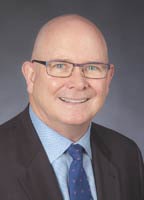
Identify two strengths and vulnerabilities of our Academy and explain how you would propose to leverage those strengths and overcome those vulnerabilities to ensure future stability and success of the organization.
1. It’s truly an honor to be considered for this important leadership role, especially at a time when healthcare in America is at such a critical juncture.
How effectively we are able to respond to the many challenges that face our specialty—and ultimately the patients we care for—will depend, to some extent, on the effectiveness of our Academy leadership and our strategic plan.
More importantly, our success will depend on commitments from each of us to personally contribute in some way to the effort. Member engagement is one of our greatest strengths: the willingness of so many of our members to contribute their knowledge, their time, their leadership skills, and even their financial resources is remarkable. I am willing to make such a commitment, and I will invite and encourage each of you to do so as well.
Another strength is our growing sense of unity within otolaryngology. Relative to other specialties, we are just not that large. However, our influence can, and should, be disproportionately greater than our absolute numbers. By making certain that the Academy represents all of otolaryngology, in all of its richly diverse aspects, we optimize our effectiveness. We should further develop our Specialty Society Advisory Council, and pursue a vision that our membership and our leadership will reflect the diversity of the patients we serve. We must remain relevant to members from every subspecialty, welcome innovative ideas, and respectfully incorporate potentially conflicting viewpoints and priorities.
In the context of the Academy’s Strategic Plan, what changes do you envision will be necessary in our Academy during the next three to five years in order to meet the educational, research, advocacy, and fiscal challenges presented by evolving healthcare policy and legislation?
2. I believe our most fundamental challenge is to convincingly demonstrate the value of the unique services we provide. This value must be made obvious to those who are even now making decisions as to the relative worth of our services in new models of care and reimbursement. We must be able to define, measure, and transparently report the value of our work. This will require commitment to further guideline and quality metrics development, and to systems that facilitate their incorporation into our practices.
We must communicate this message of value with a clear and unified voice; reaching out to our patients, to those who pay for healthcare, and those who set policy in a compelling and convincing manner. This will require strengthening our advocacy presence, both through broader PAC participation and through effective coordination of our grassroots engagement efforts.
What is the most important issue facing otolaryngology-head and neck surgery, as a profession, in the next two to three years?
3. So, we do not lack for challenges, and there is plenty of potential for frustration. No one will argue that. But we are fortunate. There is meaning, and sometimes even joy in the work we do. We need more of both. We need solutions that optimize professional satisfaction, and patient outcomes. I believe they exist. My experience in an academic referral-based practice, followed by an even longer stint in a large, innovative multi-specialty group has taught me that our challenges are more shared than disparate. I’ve seen that a compelling vision and supportive, respectful leadership can make a difference. I would welcome the opportunity to take on these many challenges with my colleagues on the Academy leadership team.
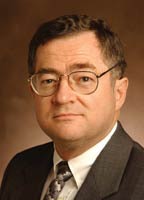
Identify two strengths and vulnerabilities of our Academy and explain how you would propose to leverage those strengths and overcome those vulnerabilities to ensure future stability and success of the organization.
1. Our strategic planning process and caliber of Academy leadership are perhaps our greatest strengths. Strategic planning provides our roadmap as we look forward in an increasingly complex medical environment. Virtually every significant Academy activity is viewed from the perspective of adherence to the strategic plan, which in turn is reappraised annually. Our vulnerabilities include fragmentation and loss of specialty unity coupled with our relatively small size. Enhancing strategic planning with a long-range view is axiomatic as is the importance of identifying and mentoring the next generation of leaders. It would be my intention to seek out potential leaders on as broad and diverse a basis as possible from within our Academy. Every opportunity to engage our subspecialty societies in Academy activities (e.g., advocacy, education, research) must be explored, not to subsume those societies, but to optimize and enhance our specialty’s influence. The existing Specialty Society Advisory Council is a wonderful mechanism that will be utilized to its full potential. Encouraging member involvement in entities outside of our specialty, such as the AMA CPT Editorial Panel, magnifies our influence.
In the context of the Academy’s Strategic Plan, what changes do you envision will be necessary in our Academy during the next three to five years in order to meet the educational, research, advocacy, and fiscal challenges presented by evolving healthcare policy and legislation?
2. The Academy has been in the forefront of education, but will need to adopt new methods of delivering relevant materials to members, typically in an electronic format. It must become increasingly involved with development of educational content to assist members to maintain Board Certification. Coordinating these efforts wherever possible with our sibling societies and among the coordinators for program, instruction courses, and education should help avoid duplicative efforts in these times of limited resources while maintaining the highest content standards.
To receive reimbursement for use of new and existing technologies, it is increasingly important that evidence-based research be available to support medical necessity and effectiveness. The Academy must help coordinate and disseminate this outcomes-based research.
During the last couple of years, in addition to its ongoing work with CMS, the Academy has devoted increasing resources to reviewing reimbursement policies of private payers. These activities must continue because of their profound potential effect on membership.
In these times of decreasing corporate support, the Academy has created a robust development initiative, which I fully support.
What is the most important issue facing otolaryngology-head and neck surgery, as a profession, in the next two to three years?
3. Perhaps the greatest challenge the specialty faces is the relentless trend of decreasing reimbursement and increasing expenses and administrative burdens experienced by most members. Regardless of the fate of the Affordable Care Act, this squeeze seems inexorable and will likely result in changes decoupling reimbursement from the traditional fee-for-service model. Adding to this uncertainty are additional mandates to employ EMRs, utilize electronic prescribing, and implement ICD-10 diagnostic coding. I believe it is the Academy’s role to provide members with as many tools as possible to deal with these changes and, wherever possible, modify or mitigate unreasonable elements. For example, eliminating some of the burdensome ICD-10 coding rules and further delaying its implementation are goals worth consideration. These changes, of course, are occurring in the context of a flat to shrinking workforce and scope-of-practice pressures from non-physician providers.
Candidates for Director At-Large (Academic) (vote for one)
In your view, what are the three most important elements of the Academy’s current Strategic Plan and how would you propose advancing them?
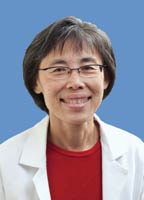
I am honored to be nominated to serve as director at-large. Our Academy can play a major role in developing policies to improve reimbursement for our specialty, stop unfair business practices, and address scope-of-practice legislation. We need to work with policy makers to ensure that we can provide cost-effective, high quality, compassionate care through efficient clinical care delivery systems. Another important role of the Academy is education of providers and the public, and to promote scientific research. Evidence-based medical research is critical to defining the best treatment paradigms and delivery of the highest quality healthcare.
We need to raise funds for this endeavor. The Academy has a long track record of facilitating data collection and multicenter outcomes-based research and should continue to foster this. Furthermore, we need to raise public awareness of the outstanding research our specialty has produced. It would be a privilege for me to serve as director at-large and build on the Academy’s strengths to develop initiatives to keep driving all these issues forward. I would also incorporate member input to define the vision that serves our membership.
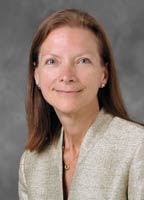
Education and Knowledge; Research and Quality; Membership Strength and Unity
For the Academy’s strategic plan to be successful each element must be put in context with an unwavering commitment by our specialty to patient care. To remain relevant in this era of healthcare reform, the specialty of otolaryngology must pursue evidence-based research in the efficiency and cost-effectiveness of patient care in relation to quality of care and patient outcomes. To demonstrate our value as specialty providers, we need to stay at the forefront of discovery for the patients who rely on us for care that only we can provide.
The Academy needs to align research and quality activities with those of education and knowledge to develop a road map for Maintenance of Certification. By embedding these activities, the rank and file of otolaryngologists will become a narrow network of high-performing providers who are recognized as thought leaders and clinical experts in delivering high-quality, cost-effective, advanced patient care. Although the field of otolaryngology lacks the large numbers of other specialties, the Academy’s focused efforts of education, research, and quality improvement will serve to enhance the strength and unity of our membership as we continue to educate the government, payers, and the public on the clinical, educational, and research value of our specialty.
Candidates for Director At-Large (Private Practice) (vote for one)
In your view, what are the three most important elements of the Academy’s current Strategic Plan and how would you propose advancing them?
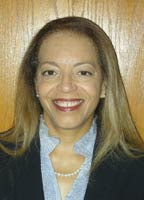
Advocacy/Health Policy: Despite the uncertainty created by the Affordable Care Act, we must clearly and carefully map out our future strategies, which should be adaptable to our changing healthcare environment. Informed by my experience with the Board of Governors as a public relations representative for the Diversity Committee, I believe we should continue our outreach efforts to legislators and other policy- makers. Also, developing alliances with community physicians will help us understand the needs of our members and recruit policy advocates.
Research and Quality: As a physician of the Colorado Kaiser Permanente Medical Group for 21 years, and as a representative to the Kaiser National Diversity Council for 14 years, I have been involved in quality and research efforts around equitable care. I know from practice that evidence-based care that is replicable in outcomes, yet adaptable to the individual, is essential to effective and safe treatment of patients.
Membership Strength/Unity: Our strength and our challenge lie in our diversity. How can we manage and serve our global membership when there are gender differences in communication, generational differences influencing our workplace interactions, and barriers to inclusion? We have rich cultural resources waiting to be tapped. These varied viewpoints empower our Academy.
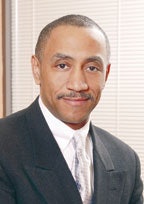
The future of our specialty lies not only in the training that is provided to our residents, but also in the example our Academy demonstrates in the areas of advocacy, education, and unity. The past few years for our Academy have been exciting and monumental in the face of a changing healthcare environment, both for us and our patients.
I have been an active member of the Board of Governors for nearly 20 years, served on numerous committees, attended yearly legislative meetings, and currently serve as chair of the Diversity Committee. The opportunity to attend our Board of Directors meetings as a non-voting guest during the past few years (representing the Diversity Committee) has confirmed my interest in continuing to serve our great organization. We must continue to be 1. tuned in to the needs of our membership, 2. unified in our efforts and attention, and 3. always focused on empowering our membership to “deliver the best patient care.” I am honored to be considered for this position and am prepared to serve.
Candidates for Audit Committee (vote for one)
What is your particular experience or interest that would make you an effective member of the Audit Committee of the Academy?
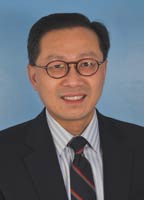
I am experienced in audit, budget, and operations matters that affect large and small enterprises. Leveraging an MBA in finance from the Berkeley Haas Business School, I served as chair of the Committee on Academic Planning and Budget at the University of California, San Francisco from 2010 to 2011. Our committee analyzed and responded to post-employment benefits reform, reallocation methodology of state funds to the campus, policy change to outside professional income, operations consolidation of contracts and grants, and a new funds flow model for the entire University of California.
I am currently a member of the Finance Committee for the Association for Research in Otolaryngology and the Audit Committee for the American Otological Society. I enjoy reviewing accounting statements to assess financial and operational positions of organizations. Critical financial data analysis can help shape organizational decisions to promote accountability, financial stability, and operational efficiency.
It would be an honor to serve on the Audit Committee. This advisory group plays a central role in assisting the Board of Directors to fulfill fiduciary duties to the membership. Academy members deserve independent-minded, critical, and comprehensive review of their organization’s financial and operational practices. I hope to be your vigorous advocate for accountability.
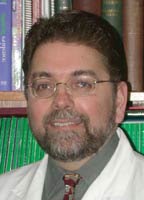
I would be extremely honored to serve as a member of the Audit Committee. I have a strong commitment to serving the Academy and have been active as a member of the General Otolaryngology Education Committee in the past. I also served as the American Bronchoesophagological Association (ABEA) representative to the Academy, and currently serve as the ABEA representative to the Board of Governors. My experience in financial oversight comes from a number of current leadership roles, including associate chief medical officer at Boston Medical Center (BMC), member of BMC’s Revenue Committee, chair of BMC’s Graduate Medical Education Committee, secretary of the ABEA, and vice chairman of the department of otolaryngology at Boston University Medical Center, as well as several past leadership positions. These include interim chief medical officer and vice president of medical affairs at BMC from 2007 to 2008, and secretary-treasurer of the New England Otolaryngological Society.
If elected, I will work closely with the Academy and assist the Board of Directors to ensure appropriate oversight of the Academy’s financial matters.
Candidates for Nominating Committee (Private Practice) (vote for two)
What do you see as the priorities of the Nominating Committee in selecting the future leaders of our Academy?
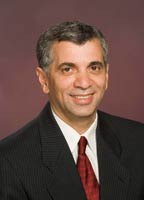
I thank the Academy leadership and the current Nominating Committee for considering me for the position of a member of the Nominating Committee.
If elected, I will strive to nominate candidates from all aspects of otolaryngology practice. The traditional division between academic medicine and private practice is becoming less distinct and, therefore, increasingly irrelevant. During the last 15 years, a new category of otolaryngologists is emerging. These are neither academicians nor pure private practitioners.
They are members of large (sometimes gigantic) single specialty and multi-specialty groups or hospital systems. They deserve a voice and representation. As a Nominating Committee member, I will also seek the nominations of candidates with diverse backgrounds including age, race, gender, and subspecialty. A candidate who has served his/her local community well is as important to be considered for leadership position as those who previously had positions in the Academy and other national organizations. Vision, commitment, dedication, and the ability to advocate for our profession are the qualities I seek in a potential candidate. And lastly, I will support candidates who can inspire young physicians to engage, to participate, and to become active in our great specialty as well as dedicated members of our Academy.
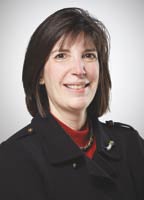
It is an honor to have been selected as a candidate for, and will be a greater honor to serve on, the Nominating Committee. The members of this committee are charged by the Academy to select our future leaders. This responsibility demands a group of forward thinking individuals who will represent the Academy membership. The AAO-HNS is a diverse group and the Nominating Committee must represent young and experienced members, as well as those in academic medicine and in private practice situations. With my present experience as a partner in a mature private practice, and a part-time faculty member in a vibrant university-based otolaryngology department, I have a broad background in both perspectives. As a past president of the Maryland Society of Otolaryngology and a hospital board member, I know the rapidly changing regulatory issues that affect AAO-HNS membership. I have served on and chaired numerous committees in the AAFPRS, I have been the program chair for a recent AAFPRS annual meeting and with such, I will honor the responsibility of an AAO-HNS office.
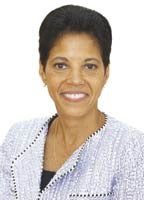
It matters not whether the Democrats or Republicans win the upcoming election; medicine as we know is destined to change. As individual physicians and a collective Academy we can be passive participants in this change or we can be leaders. We can assure that our patients have access to quality care and that we, as physicians, can practice medicine in a manner in which we feel comfortable. The priorities of the Nominating Committee of the Academy must be to identify and promote medical leaders to steer us through these difficult times.
My background as an academic otolaryngologist at a large University Medical Center for 13 years, and nine years in private practice, allow me to understand the concerns of our diverse membership, and identify individuals who will represent all of our interests. Thank you for your consideration of my candidacy to serve the Academy as a member of the Nominating Committee.
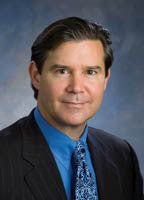
While serving on the Academy Board of Directors as the first coordinator for research, I came to understand the importance of identifying diverse individuals who were collaborative and comfortable in making decisions focused on our broad membership. We need to populate leadership roles, through election, with members who are experienced and willing to serve unselfishly. The Nominating Committee plays an incredibly important role in ensuring that our Academy has a slate of candidates who would all be outstanding leaders so that the membership can decide who they wish to represent them.
The Academy has been an important part of my professional life during the past quarter century. Giving back to the Academy is very satisfying, whether it be committee service, grant reviews, participation in developing new programs, playing leadership roles, or financially via vehicles, such as the Millennium Society or the Hal Foster, MD, Endowment program. My past career in academic medicine and now as a corporate officer in a nonprofit healthcare system has given me a broad experience to draw from in helping to identify other members who would be willing to serve. Serving our Academy as a Nominating Committee member is a responsibility I would welcome.
Candidates for Nominating Committee (Academic) (vote for two)
What do you see as the priorities of the Nominating Committee in selecting the future leaders of our Academy?
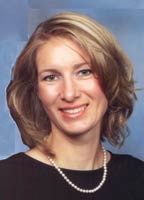
Our Academy is highly dynamic and forward thinking, and as such, candidates for leadership must also display these characteristics. As a member of the Nominating Committee, I will select candidates whose words and actions suggest an internal compass focused on allowing members to provide the best patient care in otolaryngology-head and neck surgery. Desirable candidates will have displayed a dedication to the specialty and our Academy as evidenced by a volunteer spirit, team player mentality, and the ability to motivate and inspire. I will advocate for diverse individuals who have shown energy and enthusiasm, a vision for the continued success of our specialty, and the ability to identify and tap into the enormous and unique talents of our members. Our future leaders must be willing to listen to colleagues and make sound decisions that will promote the advancement of the specialty and ultimately the care of our patients.
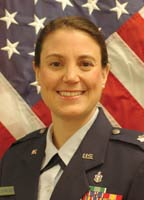
The priority of the Nominating Committee is to ensure that Academy leadership positions are filled by the most qualified individuals who will move our specialty forward with a strong, unified voice—supporting the needs of our membership through these times of political and economic change. While our leadership sets the direction, it is the strength of our membership that ensures the future success of the AAO-HNS. It has been my privilege to experience first-hand the dedication and talent of our Academy members through my service on the CORE Study Group, Editorial Board, Head and Neck Surgery and Oncology Committee, and Trauma Committee. From the ranks of our talented membership, the Nominating Committee is charged to identify driven and dedicated visionaries who are both forward thinking and willing to learn from others. Diversity is our greatest strength and must be represented at the leadership level by drawing upon the expertise of all backgrounds, subspecialties, and platforms to include academic, private, government, military, rural, and urban settings. The Committee must include both young, talented members who bring fresh ideas and perspective, along with the organizational and political expertise of seasoned, experienced members who will mentor our next generation of otolaryngology leaders.
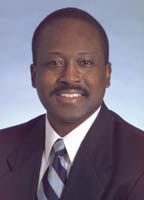
I am prepared to help the AAO-HNS choose leaders that will advance the relevance and prominence of this specialty in the face of changing market forces, regulatory demands, and patient expectations. The Academy’s visionary and proactive stance on 1. promoting evidence-based practice, 2. measuring and maximizing quality of care and patient safety, and 3. supporting the development of new knowledge requires the right kind of leadership. These efforts promise to strengthen the negotiating position of the AAO-HNS as we advocate for legislative, regulatory, and reimbursement policies on behalf of our members and patients. I believe that my professional and leadership experiences in quality improvement, as a residency program director, and as past president of the Maryland Society of Otolaryngology provide me with important insights about the leadership qualities needed for success in an increasingly complex practice landscape.
I will work with fellow committee members to seek leaders with the professional experience, leadership skills and track record needed to position the Academy for increased influence in healthcare legislative and regulatory decisions that affect our profession and our patients. They should be able to convincingly promote the Academy’s mission and engender enthusiasm and participation in its implementation.
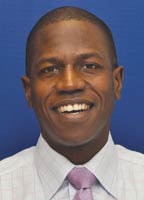
In selecting our Academy’s future leaders, it is essential that they be committed to executing our core mission: “Working for the best Ear, Nose, and Throat care…and delivering the highest quality of healthcare to our patients.” Our leaders should ensure that otolaryngologists set the standard in delivering healthcare that is safe and effective, patient-centered, timely, efficient, and equitable. This also should be accomplished while continuing to provide the best continuing educational tools and opportunities for our physician members.
Moreover, I believe our future leaders should have an established record and ongoing passion for protecting our specialty’s interest in the context of delivering the best care to our patients. They should have the requisite leadership, vision, and will to navigate our Academy through the challenging political, medico-legal and economic dynamics that exist in healthcare today. Finally, our leaders should have no hesitation in boldly proclaiming our Academy’s voice to our members, patients, and national leaders.
